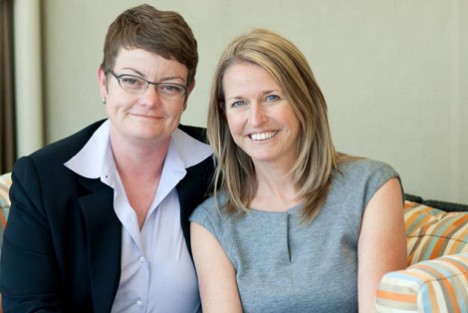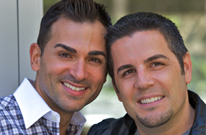U.S. Court of Appeals Upholds Federal District Court Ruling that Proposition 8 is Unconstitutional
Ninth Circuit:
ŌĆ£Proposition 8 serves no purpose ŌĆ” other than to lessen the status and human dignity of gays and lesbians in California.ŌĆØ
San Francisco, CA ŌĆō Today, the United States Court of Appeals for the Ninth Circuit issued a ruling in Perry v. Brown upholding the historic August 2010 decision of the Federal District Court that found Proposition 8 unconstitutional. ┬ĀIn an opinion authored by Judge Stephen Reinhardt, the Ninth Circuit concluded that Proposition 8 violates the Equal Protection Clause of the Fourteenth Amendment to the United States Constitution.
ŌĆ£Proposition 8 serves no purpose, and has no effect, other than to lessen the status and human dignity of gays and lesbians in California, and to officially reclassify their relationships and families as inferior to those of opposite-sex couples. ┬ĀThe Constitution simply does not allow for laws of this sort,ŌĆØ Judge Reinhardt wrote.
 ŌĆ£This case is about marriage and equality. ┬ĀPlaintiffs in this case, like millions of other gay and lesbian Americans, are being denied both the right to marry and the right to be treated with equal dignity and respect under the law,ŌĆØ said PlaintiffsŌĆÖ lead co-counsel Theodore B. Olson. ┬ĀŌĆ£Under our Constitution, gays and lesbians cannot be denied the most fundamental freedom in American societyŌĆöthe freedom to marry. ┬ĀTodayŌĆÖs momentous decision reminds us that it is time that we, as Americans, treat all of our fellow citizens with fairness and decency.ŌĆØ
ŌĆ£This case is about marriage and equality. ┬ĀPlaintiffs in this case, like millions of other gay and lesbian Americans, are being denied both the right to marry and the right to be treated with equal dignity and respect under the law,ŌĆØ said PlaintiffsŌĆÖ lead co-counsel Theodore B. Olson. ┬ĀŌĆ£Under our Constitution, gays and lesbians cannot be denied the most fundamental freedom in American societyŌĆöthe freedom to marry. ┬ĀTodayŌĆÖs momentous decision reminds us that it is time that we, as Americans, treat all of our fellow citizens with fairness and decency.ŌĆØ
ŌĆ£Proposition 8 operates with no apparent purpose but to impose on gays and lesbians, through the public law, a majorityŌĆÖs private disapproval of them and their relationships, by taking away from them the official designation of ŌĆśmarriage,ŌĆÖ with its officially recognized status. ┬ĀProposition 8 therefore violates the Equal Protection Clause,ŌĆØ the Ninth Circuit concluded.
The American Foundation for Equal Rights (AFER) is the sole sponsor of the Perry case.
 ŌĆ£Today, the Ninth Circuit Court of Appeals affirmed a simple, fundamental American truth: How we are born, and who we choose to love, should not be a basis for discrimination in this country,ŌĆØ said AFER Board President Chad Griffin. ┬ĀŌĆ£Every American, regardless of race, ethnicity, or sexual orientation, deserves the same dignity and respect, the same freedom to love and to marry and to build a family. ┬ĀThatŌĆÖs all this case is about. ┬ĀNot special rights or privileges, just fairness and equality.ŌĆØ
ŌĆ£Today, the Ninth Circuit Court of Appeals affirmed a simple, fundamental American truth: How we are born, and who we choose to love, should not be a basis for discrimination in this country,ŌĆØ said AFER Board President Chad Griffin. ┬ĀŌĆ£Every American, regardless of race, ethnicity, or sexual orientation, deserves the same dignity and respect, the same freedom to love and to marry and to build a family. ┬ĀThatŌĆÖs all this case is about. ┬ĀNot special rights or privileges, just fairness and equality.ŌĆØ
The Ninth Circuit unanimously rejected ProponentsŌĆÖ baseless and offensive attempt to impugn the reputation of the United States District Chief Judge who struck down Proposition 8. ┬ĀUnable to defend Proposition 8 on its merits, Proponents claim that the now-retired Chief Judge Vaughn R. Walker was disqualified from ruling on Proposition 8 and that his historic decision should be vacated because he is gay and in a same-sex relationship.
ŌĆ£There are days in our nationŌĆÖs history when genuine progress toward our constitutional goal of forming a more perfect union is realized. ┬ĀWithout question, today is one of those days,ŌĆØ said PlaintiffsŌĆÖ lead co-counsel David Boies. ┬ĀŌĆ£Once again the federal courts have determined that singling out gays and lesbians for unequal treatment serves no legitimate state interest. ┬ĀWith todayŌĆÖs decision, we take an enormous step toward eliminating the last vestige of discrimination against gay and lesbian Americans.ŌĆØ
ŌĆ£Today, the Ninth Circuit Court of Appeals said to our family and so many others that we are equals under the law,ŌĆØ said plaintiff Kris Perry. ┬ĀŌĆ£Sandy and I look forward to the closure and celebration that will come from the end of Proposition 8 and the beginning of married life together.ŌĆØ
ŌĆ£Being gay does not make me any less American or any less of a person,ŌĆØ said plaintiff Paul Katami. ┬ĀŌĆ£I am proud of who I am. ┬ĀI believe in our freedoms. ┬ĀI believe in the truth. ┬ĀI believe in our judicial system. ┬ĀThe District CourtŌĆÖs ruling, and the Ninth CircuitŌĆÖs affirmation of that ruling, is based on facts and the truth.ŌĆØ
Background on Perry v. Brown
In May 2008, the California Supreme Court held that the stateŌĆÖs denial of marriage for gay and lesbian couples violated CaliforniaŌĆÖs Constitution. ┬ĀPrior to the adoption of Proposition 8, more than 18,000 gay and lesbian couples were married in California.
Proposition 8 was enacted in November 2008 by a narrow majority of California voters. ┬ĀThe initiative measure amended the California Constitution to eliminate the right of gay and lesbian couples to marry. ┬ĀOn May 26, 2009, the California Supreme Court rejected a state constitutional challenge to Proposition 8.
The Perry case was filed on May 22, 2009 in Federal District Court on behalf of two California couples. ┬ĀPlaintiffs are represented by an all-star legal team led by Theodore B. Olson and David Boies, who notably faced-off in Bush v. Gore.
Both the Governor and Attorney General of California declined to defend Proposition 8, with the Attorney General conceding that Proposition 8 is unconstitutional. ┬ĀThe official proponents of Proposition 8 were permitted to intervene to defend their discriminatory law. ┬ĀThe City and County of San Francisco was granted leave to intervene in support of Plaintiffs.
Plaintiffs
 Kris Perry and Sandy Stier have been together eleven years and are the parents of four boys. ┬ĀKris directs a state agency that promotes education and health for children ages zero to five. ┬ĀSandy works for a county health department. ┬ĀTheir home life centers around their kids, with PTA meetings, soccer games, and music lessons taking up most of their free time. ┬ĀThey live in Berkeley, California.
Kris Perry and Sandy Stier have been together eleven years and are the parents of four boys. ┬ĀKris directs a state agency that promotes education and health for children ages zero to five. ┬ĀSandy works for a county health department. ┬ĀTheir home life centers around their kids, with PTA meetings, soccer games, and music lessons taking up most of their free time. ┬ĀThey live in Berkeley, California.
 Paul Katami and Jeff Zarrillo have been together over ten years. ┬ĀPaul is a fitness expert and small business owner. ┬ĀJeff is the general manager of a theater exhibition company. ┬ĀThey own a home together in Burbank, California, and are proud uncles.
Paul Katami and Jeff Zarrillo have been together over ten years. ┬ĀPaul is a fitness expert and small business owner. ┬ĀJeff is the general manager of a theater exhibition company. ┬ĀThey own a home together in Burbank, California, and are proud uncles.
District Court Trial
In January 2010, a twelve-day public trial was held before Chief Judge Vaughn R. Walker of the United States District Court for the Northern District of California. ┬ĀPlaintiffs presented 17 witnessesŌĆöincluding the worldŌĆÖs leading experts in history, economics, political science, psychology, sociology, anthropology, child development and epidemiology. ┬ĀProponents presented just two witnesses. ┬ĀTheir star witness, David Blankenhorn, testified under oath that ŌĆ£we would be more American on the day we permitted same-sex marriage than we were on the day before.ŌĆØ ┬ĀClosing arguments were heard in June 2010.
Shunning our nationŌĆÖs tradition of transparency and public access, Proponents vigorously objected to a television and Internet broadcast of the trial proceedings. ┬ĀNevertheless, the district court, without objection from any party, recorded the proceedings on video. ┬ĀThat digital recording is now under seal as part of the case record.
District Court Ruling
On August 4, 2010, the district court found in favor of Plaintiffs and declared Proposition 8 unconstitutional. ┬ĀIn an historic 136-page decision, Chief Judge Walker issued 80 carefully reasoned factual findings that systematically dismantled ProponentsŌĆÖ discriminatory arguments in favor of Proposition 8. ┬ĀThe district court concluded, ŌĆ£Because California has no interest in discriminating against gay men and lesbians, and because Proposition 8 prevents California from fulfilling its constitutional obligation to provide marriages on an equal basis, the court concludes that Proposition 8 is unconstitutional.ŌĆØ
ProponentsŌĆÖ Appeal
The anti-marriage proponents of Proposition 8 immediately appealed the district courtŌĆÖs ruling to the United States Court of Appeals for the Ninth Circuit. ┬ĀThe Governor and Attorney General of California declined to appeal Chief Judge WalkerŌĆÖs decision. ┬ĀAfter an expedited briefing schedule, a three-judge panel heard oral arguments on December 6, 2010 that were broadcast live on television and the Internet. ┬ĀThe oral arguments were the most watched appellate court proceeding in American history.
Advisory Opinion From the California Supreme Court
On January 4, 2011, the Ninth Circuit issued an order certifying a question to the California Supreme Court concerning the rights under state law of the official proponents of a ballot initiative. ┬ĀThe Ninth Circuit required such clarification to determine whether the Proponents possess legal ŌĆ£standingŌĆØ to maintain their appeal. ┬ĀAfter hearing oral arguments in September 2011, the California Supreme Court issued a decision on November 17, 2011, concluding:
ŌĆ£[W]hen the public officials who ordinarily defend a challenged state law or appeal a judgment invalidating the law decline to do so, under article II, section 8 of the California Constitution and the relevant provisions of the Elections Code, the official proponents of a voter-approved initiative measure are authorized to assert the stateŌĆśs interest in the initiativeŌĆśs validity, enabling the proponents to defend the constitutionality of the initiative and to appeal a judgment invalidating the initiative.ŌĆØ
Proponents Attack District Court Judge
Unable to defend Proposition 8 on its merits, in April 2011 Proponents launched a series of desperate and widely denounced attacks on the integrity of the federal judiciary. ┬ĀProponents claim that the now-retired Chief Judge Walker was disqualified from ruling on Proposition 8 because he is gay and in a same-sex relationship. ┬ĀSince Chief Judge Walker did not recuse himself, Proponents argue that his historic decision should be vacated. ┬ĀTheir baseless attack on Chief Judge Walker was roundly rejected by United States District Chief Judge James Ware in June 2011, who observed that ŌĆ£we all have an equal stake in a case that challenges the constitutionality of a restriction on a fundamental right.ŌĆØ┬Ā
Proponents Attempt to Hide Video Recording of Trial
Also in April 2011, Proponents sought to forever conceal the video recording of the trial. ┬ĀIn response, Plaintiffs moved to unseal the trial video recording in the district court, citing the presumption of access to judicial records under the First Amendment and common law. ┬ĀOn September 19, 2011, Chief Judge Ware agreed with Plaintiffs, emphasizing that ŌĆ£Transparency is pivotal to public perception of the judiciaryŌĆÖs legitimacy and independence.ŌĆØ
Proponents appealed both of Chief Judge WareŌĆÖs decisions to the Ninth Circuit. ┬ĀAfter an expedited briefing schedule, the same three-judge panel of that court heard oral arguments on December 8, 2011 regarding the public release of the trial videotapes and ProponentsŌĆÖ offensive attempt to disqualify former Chief Judge Walker because he is gay.
On February 2, 2012, the Ninth Circuit reversed Chief Judge WareŌĆÖs order unsealing the digital video recording of the trial.
ŌĆ£8ŌĆØ: An Unprecedented Account of an Historic Trial
In order to ensure that the public would be able to experience what happened at trial, AFER teamed up with Broadway Impact to produce ŌĆ£8,ŌĆØ a play chronicling the historic twelve-day trial. ┬ĀWritten by AFER Founding Board Member and Academy Award-winning writer Dustin Lance Black, ŌĆ£8ŌĆØ had its much-heralded Broadway world premiere on September 19, 2011, at the sold-out Eugene OŌĆÖNeill Theatre in New York City. ┬ĀThe production brought in over one million dollars to support AFERŌĆÖs efforts to achieve full federal marriage equality.
ŌĆ£8ŌĆØ is set to have its West Coast premiere at the Wilshire Ebell Theatre on Saturday, March 3, 2012, in Los Angeles, for an exclusive, one-night-only fundraiser to benefit AFER. ┬ĀThe West Coast premiere will feature an all-star cast, including Academy Award-winning actor, producer, screenwriter and director George Clooney and Emmy and Golden Globe Award-winning actor Martin Sheen; and be directed by AFER Founding Board Member and acclaimed actor and director Rob Reiner.
In addition to its Broadway and Los Angeles productions, AFER and Broadway Impact are licensing ŌĆ£8ŌĆØ to colleges and community theatres nationwide in order to spur action, dialogue and understanding.
###
About the American Foundation for Equal Rights
The American Foundation for Equal Rights is the sole sponsor of the Perry case. After bringing together Theodore B. Olson and David Boies to lead its legal team, AFER successfully advanced the Perry case through Federal District Court and is now leading it through the 9th Circuit Court of Appeals before the case is brought to the United States Supreme Court. The Foundation is committed to achieving full federal marriage equality.

